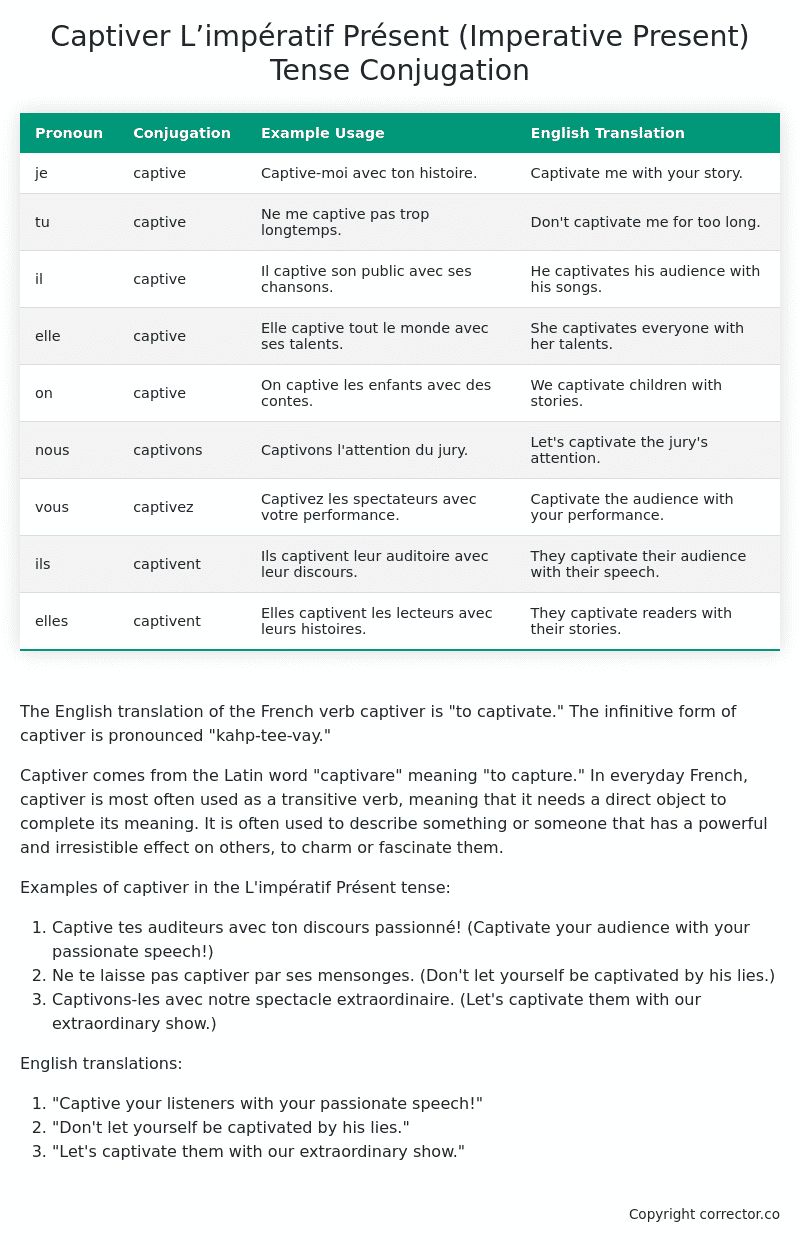L’impératif Présent (Imperative Present) Tense Conjugation of the French Verb captiver
Introduction to the verb captiver
The English translation of the French verb captiver is “to captivate.” The infinitive form of captiver is pronounced “kahp-tee-vay.”
Captiver comes from the Latin word “captivare” meaning “to capture.” In everyday French, captiver is most often used as a transitive verb, meaning that it needs a direct object to complete its meaning. It is often used to describe something or someone that has a powerful and irresistible effect on others, to charm or fascinate them.
Examples of captiver in the L’impératif Présent tense:
- Captive tes auditeurs avec ton discours passionné! (Captivate your audience with your passionate speech!)
- Ne te laisse pas captiver par ses mensonges. (Don’t let yourself be captivated by his lies.)
- Captivons-les avec notre spectacle extraordinaire. (Let’s captivate them with our extraordinary show.)
English translations:
- “Captive your listeners with your passionate speech!”
- “Don’t let yourself be captivated by his lies.”
- “Let’s captivate them with our extraordinary show.”
Table of the L’impératif Présent (Imperative Present) Tense Conjugation of captiver
| Pronoun | Conjugation | Example Usage | English Translation |
|---|---|---|---|
| je | captive | Captive-moi avec ton histoire. | Captivate me with your story. |
| tu | captive | Ne me captive pas trop longtemps. | Don’t captivate me for too long. |
| il | captive | Il captive son public avec ses chansons. | He captivates his audience with his songs. |
| elle | captive | Elle captive tout le monde avec ses talents. | She captivates everyone with her talents. |
| on | captive | On captive les enfants avec des contes. | We captivate children with stories. |
| nous | captivons | Captivons l’attention du jury. | Let’s captivate the jury’s attention. |
| vous | captivez | Captivez les spectateurs avec votre performance. | Captivate the audience with your performance. |
| ils | captivent | Ils captivent leur auditoire avec leur discours. | They captivate their audience with their speech. |
| elles | captivent | Elles captivent les lecteurs avec leurs histoires. | They captivate readers with their stories. |
Other Conjugations for Captiver.
Le Present (Present Tense) Conjugation of the French Verb captiver
Imparfait (Imperfect) Tense Conjugation of the French Verb captiver
Passé Simple (Simple Past) Tense Conjugation of the French Verb captiver
Passé Composé (Present Perfect) Tense Conjugation of the French Verb captiver
Futur Simple (Simple Future) Tense Conjugation of the French Verb captiver
Futur Proche (Near Future) Tense Conjugation of the French Verb captiver
Plus-que-parfait (Pluperfect) Tense Conjugation of the French Verb captiver
Passé Antérieur (Past Anterior) Tense Conjugation of the French Verb captiver
Futur Antérieur (Future Anterior) Tense Conjugation of the French Verb captiver
Subjonctif Présent (Subjunctive Present) Tense Conjugation of the French Verb captiver
Subjonctif Passé (Subjunctive Past) Tense Conjugation of the French Verb captiver
Subjonctif Imparfait (Subjunctive Imperfect) Tense Conjugation of the French Verb captiver
Subjonctif Plus-que-parfait (Subjunctive Pluperfect) Tense Conjugation of the French Verb captiver
Conditionnel Présent (Conditional Present) Tense Conjugation of the French Verb captiver
Conditionnel Passé (Conditional Past) Tense Conjugation of the French Verb captiver
L’impératif Présent (Imperative Present) Tense Conjugation of the French Verb captiver (this article)
L’infinitif Présent (Infinitive Present) Tense Conjugation of the French Verb captiver
Struggling with French verbs or the language in general? Why not use our free French Grammar Checker – no registration required!
Get a FREE Download Study Sheet of this Conjugation 🔥
Simply right click the image below, click “save image” and get your free reference for the captiver L’impératif Présent tense conjugation!

Captiver – About the French L’impératif Présent (Imperative Present) Tense
Usage
Giving commands
Making requests
Offering advice
Expressing desires
Conjugation Formation
Interactions with other tenses
Want More?
I hope you enjoyed this article on the verb captiver. Still in a learning mood? Check out another TOTALLY random French verb conjugation!


